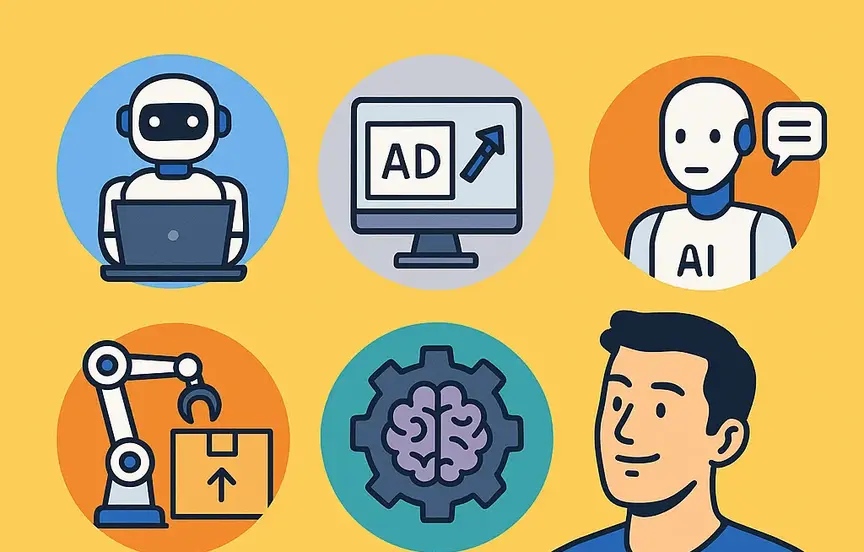AI business ideas represent the most urgent opportunity in modern entrepreneurship as we approach the 2027 AGI revolution that will reshape society more dramatically than the industrial revolution. With $160 billion invested in AI startups over the past 18 months by top venture funds including Andreessen Horowitz, Sequoia Capital, and Greylock Partners, the window for early movers to capture wealth is rapidly closing.
The AI gold rush isn’t coming – it’s happening right now. Meta alone has invested over $65 billion reinventing itself as an AI-first company, while venture capital firms are fueling the largest and most transformative funding rounds in history. The real opportunities aren’t locked in by tech giants yet, but they’re open to entrepreneurs who can move fast, spot gaps, and build tools people actually need.
According to a comprehensive AI 2027 forecast report by a former OpenAI researcher, artificial general intelligence will reshape society more than the industrial revolution did, with AI agents replacing entire departments from research to coding to operations. The report is crystal clear that early movers capture almost all the wealth, making waiting potentially catastrophic for aspiring entrepreneurs.
GPT Wrappers: The New Electricity Applications
AI business ideas centered around GPT wrappers represent one of the most accessible entry points for new entrepreneurs. These applications take ChatGPT, reprompt it with specialized expertise, and wrap it in superior user experiences that solve specific problems better than the original AI model.
The concept follows the same pattern as electricity applications from over a century ago. When electricity was first discovered, it was a powerful but general technology. Entrepreneurs then created specialized applications – toasters for heating bread, kettles for boiling water, light bulbs for illumination. Each became a standalone business by channeling electricity into specific use cases with better user experiences.
GPT wrappers work similarly by combining three key elements: capturing user data, implementing superior prompting techniques, and creating better user experiences than standard chat interfaces. This approach has already proven successful with examples like Cal AI, a nutrition and fitness app created by 18-year-old Zakia de Gary that analyzes meal photos and estimates calories.
Since launching in 2023, Cal AI has been downloaded over 8 million times and is projected to generate $30 million this year. The app’s success demonstrates how innovative AI wrappers can scale quickly with smart focus and simple minimum viable products. The key is identifying repetitive tasks in industries you understand and automating them with specialized AI tools.
Platforms like Replit make this accessible to non-programmers by turning natural language prompts into working applications with minimal coding requirements. The action step is straightforward: pick an industry you know, brainstorm three repetitive tasks you could automate, wrap GPT around one of them using simple tools like Google Sheets plus API, and test with five to ten real users weekly.
AI Marketing and Media: Content Creation Revolution
AI business ideas in marketing and media offer some of the easiest entry points for new entrepreneurs, with tools that automate content creation including captions, hashtags, voiceovers, and translations. This sector helps creators and companies scale efficiently while maintaining quality output.
Poppy AI exemplifies this opportunity perfectly. This bootstrap startup grew to over $500,000 in monthly recurring revenue within its first year by helping marketers and content creators easily create viral social media content. The platform allows users to create mind maps with real content they like, feed it their ideas, and receive perfectly crafted posts in return.
Poppy’s success proves how powerful focused AI marketing tools can be, especially when solving real pain points with simple subscription pricing models. The company’s rapid growth demonstrates the massive demand for AI-powered content creation tools that can help creators and businesses maintain consistent, high-quality output across multiple platforms.
For those not interested in content creation, another exciting opportunity exists in building and monetizing custom AI voices. Voice AI is booming as more companies and creators want custom high-quality voices for branding, advertising, and communication purposes. ElevenLabs has created a voice marketplace where individuals can record 30 minutes of their voice, create a perfect replica that speaks in multiple languages, and earn money when others use their voice.
The platform has paid out $5 million to voice creators, with many earning hundreds of dollars per month. The action step is simple: record 10 minutes of your voice, clone it with ElevenLabs, and list it on platforms like Fiverr or Voices.com to test market demand for your unique vocal characteristics.
Agentic AI: Autonomous AI Employees
AI business ideas involving agentic AI represent one of the most exciting frontiers in 2025. These aren’t just chatbots – they’re autonomous AI employees that can complete multi-step tasks and handle complex workflows without constant human intervention.
The opportunity is massive because many businesses are still struggling with basic automation. While tech-savvy individuals live in a bubble where everyone seems to be using AI, stepping outside reveals countless old-school brick-and-mortar businesses that haven’t even begun their digital transformation, let alone AI implementation.
Real estate agencies, restaurants, e-commerce stores, and countless other businesses are desperate for automation solutions but lack the knowledge to implement them. This creates enormous opportunities for entrepreneurs who can identify specific verticals, understand their pain points, and build AI employees that remove the most painful bottlenecks.
No-code platforms like Replit, Cursor, and Lovable make this accessible to non-programmers. The key is choosing a specific niche, talking to customers to understand their needs, and building something that solves their biggest problems. The opportunity lies in being the person who helps traditional businesses figure out AI when they’re still struggling with basic websites and social media strategies.
Samir Vasavada, co-founder of Wise, demonstrates the power of this approach. His company reduced from 160 employees to 40 while improving metrics tenfold by automating everything possible. They eliminated their six-person client service team by automating document signing, account openings, and processing tasks, replacing it with a two-person team that handles 20-30 times more accounts.
The Age of Autonomous AI
Agentic AI isn’t just automation — it’s the rise of autonomous AI employees transforming how businesses operate. Employers who act now can harness this revolution by hiring forward-thinking talent ready to integrate AI into real-world workflows. Post your job on WhatJobs today and connect with professionals driving the future of intelligent automation.
Post a Job Free for 30 Days →Healthcare and Wellness AI: Preventative Health Revolution
AI business ideas in healthcare and wellness are rapidly expanding, covering fitness coaching, sleep tracking, nutrition guidance, mental health support, and chronic disease monitoring. This sector offers high growth potential while avoiding the regulatory complexities of medical diagnostics.
The opportunity is particularly compelling because healthcare represents one of the most obvious transformation targets for AI technology. Reed Hoffman emphasizes that we already have the technology to create medical assistants on smartphones that are better than average doctors, available 24/7 to everyone with a smartphone for just a few dollars per hour in compute costs.
Superpower exemplifies this approach perfectly. The app provides access to medical data and lab results, allowing users to ask specific questions about foods and health decisions while automatically pulling up relevant research and medical advice. This makes preventative healthcare more accessible without requiring hospital infrastructure or medical licensing.
The key for early founders is focusing on wellness products rather than regulated medical diagnostics. This practical entry point offers high growth potential while avoiding the complex regulatory environment of medical AI. The action step is building lightweight wellness trackers like Telegram bots that provide nutrition tips for specific groups or Chrome extensions that analyze sleep diaries.
Educational AI: Personalized Learning Revolution
AI business ideas in education are already reshaping how people learn, with adaptive tutors that can prepare students for exams, teach coding, or even role-play job interviews. The sector offers enormous potential because every student can have a private coach who tracks their progress and adjusts lessons in real-time.
The opportunity is particularly compelling because people are willing to pay for personalized education that combines AI efficiency with human expertise. A GPT-powered TOEFL prep coach that tracks students’ weak points and adjusts lessons on the fly, backed by real teachers who train the AI, can dramatically improve engagement and results.
The beauty of educational AI is its infinite patience and ability to explain complex concepts in multiple ways until students understand. Whether it’s quantum mechanics, coding, or any other subject, AI tutors can provide personalized explanations and practice that adapt to each learner’s pace and learning style.
The action step is straightforward: pick one subject you know well, create a simple AI tutor (even in Telegram), share it with 10 students, get feedback, and improve based on their responses. The key is starting small with a very specific group of people and iterating based on real user feedback.
Frequently Asked Questions
What are the best AI business ideas for beginners in 2025?
The best AI business ideas for beginners include GPT wrappers for specific industries, AI marketing tools for content creation, voice cloning services, simple agentic AI for business automation, and educational AI tutors for niche subjects.
How much funding is available for AI business ideas?
Over $160 billion has been invested in AI startups in the past 18 months by top venture funds including Andreessen Horowitz, Sequoia Capital, Greylock Partners, and others, creating unprecedented opportunities for AI entrepreneurs.
Do I need programming skills to start AI business ideas?
No, you don’t need programming skills to start AI business ideas. No-code platforms like Replit, Cursor, and Lovable allow non-programmers to build AI applications using natural language prompts and simple interfaces.
What makes AI business ideas different from traditional startups?
AI business ideas can scale faster, require less initial capital, and solve problems more efficiently than traditional startups. The key is leveraging existing AI models and focusing on specific use cases rather than building technology from scratch.
A Real-World Example: Maria’s AI Success Story
Maria Rodriguez, a 28-year-old former marketing manager from Austin, Texas, represents the kind of success possible with AI business ideas. After losing her job during the pandemic, Maria discovered the opportunity in AI marketing tools and decided to build her own solution.
“I was struggling to create consistent social media content for my freelance clients,” Maria explains. “I kept hearing about AI tools but couldn’t find anything that understood my specific industry – local restaurants. So I decided to build my own.”
Maria used Replit to create a simple AI tool that analyzes restaurant menus, local food trends, and customer preferences to generate targeted social media posts. She started by testing it with five local restaurant owners she knew personally, charging $50 per month for unlimited content generation.
“Within three months, I had 20 paying customers and was making $1,000 per month,” Maria says. “The beauty was that I didn’t need to be a programmer – I just needed to understand the problem and use the right tools to solve it.”
Six months later, Maria’s AI marketing tool has grown to serve over 100 restaurants across Texas, generating $5,000 in monthly recurring revenue. She’s now hiring her first employee to help with customer support and is considering expanding to other industries.
“The key was starting small with people I already knew and solving a real problem I understood,” Maria reflects. “I didn’t try to build the next ChatGPT – I just made something that helped local restaurants create better social media content.”
Maria’s story demonstrates that AI business ideas aren’t just for tech geniuses or Silicon Valley insiders. They’re accessible to anyone who can identify a specific problem, understand their target market, and use the right tools to build a solution. The AI revolution is happening now, and the only question is whether you’ll watch it happen or be part of it.




